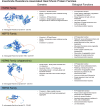Heat shock proteins, thermotolerance, and insecticide resistance in mosquitoes
- PMID: 38469339
- PMCID: PMC10926544
- DOI: 10.3389/finsc.2024.1309941
Heat shock proteins, thermotolerance, and insecticide resistance in mosquitoes
Abstract
Mosquitoes transmit pathogens that pose a threat to millions of people globally. Unfortunately, widespread insecticide resistance makes it difficult to control these public health pests. General mechanisms of resistance, such as target site mutations or increased metabolic activity, are well established. However, many questions regarding the dynamics of these adaptations in the context of developmental and environmental conditions require additional exploration. One aspect of resistance that deserves further study is the role of heat shock proteins (HSPs) in insecticide tolerance. Studies show that mosquitoes experiencing heat stress before insecticide exposure demonstrate decreased mortality. This is similar to the observed reciprocal reduction in mortality in mosquitoes exposed to insecticide prior to heat stress. The environmental shifts associated with climate change will result in mosquitoes occupying environments with higher ambient temperatures, which could enhance existing insecticide resistance phenotypes. This physiological relationship adds a new dimension to the problem of insecticide resistance and further complicates the challenges that vector control and public health personnel face. This article reviews studies illustrating the relationship between insecticide resistance and HSPs or hsp genes as well as the intersection of thermotolerance and insecticide resistance. Further study of HSPs and insecticide resistance could lead to a deeper understanding of how environmental factors modulate the physiology of these important disease vectors to prepare for changing climatic conditions and the development of novel strategies to prevent vector-borne disease transmission.
Keywords: HSPs (heat shock proteins); heat shock protein genes; insecticide resistance; mosquito; thermotolerance.
Copyright © 2024 Mack and Attardo.
Conflict of interest statement
The authors declare that the research was conducted in the absence of any commercial or financial relationships that could be construed as a potential conflict of interest. The author(s) declared that they were an editorial board member of Frontiers, at the time of submission. This had no impact on the peer review process and the final decision.
Figures


References
-
- World Health Organization . World malaria report 2022 Vol. 372. . Genève, Switzerland: World Health Organization; (2022). p.
-
- Dengue – the Region of the Americas (2023). Available at: https://www.who.int/emergencies/disease-outbreak-news/item/2023-DON475.
Publication types
LinkOut - more resources
Full Text Sources

